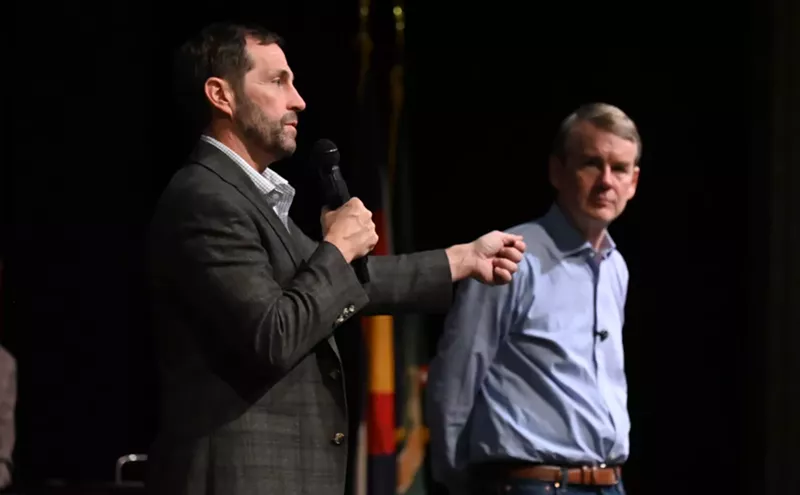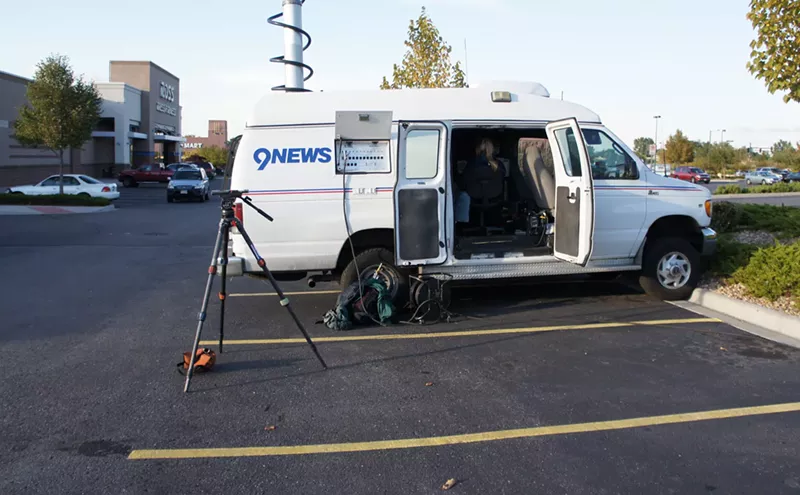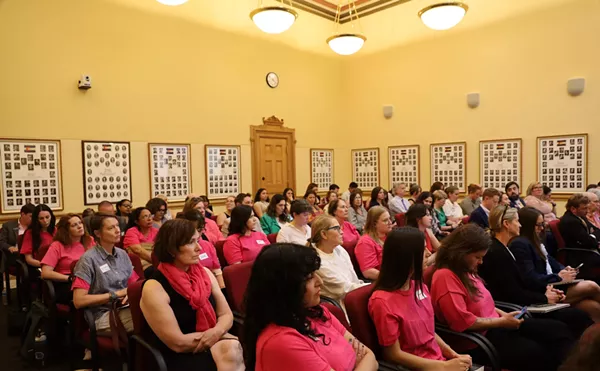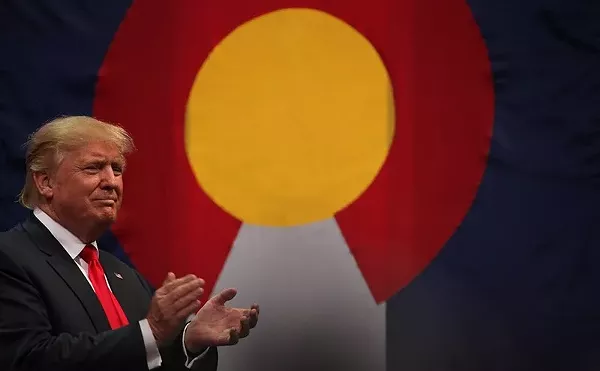What's wrong with that? Plenty, according to many observers. Aguilera and Spears, both former cast members on The New Mickey Mouse Club, are among a crop of flirty, provocative young stars being aggressively marketed to children who critics insist are far too young to fully understand the transparently sexual imagery in which they often traffic. A handful of right-wing groups have seized on this issue; for instance, Mississippi's American Family Association called for a Britney boycott after Spears appeared on the cover of Rolling Stone last year done up like a naughty schoolgirl eager for deflowering. Yet countless parents without political axes to grind are equally concerned that the most prominent female role models for the current generation all seem to be not just vapid but in heat.
Stuck in the middle of this issue is Radio Disney, a national syndicator (heard locally on KADZ-AM, at 1550 on your dial) that touts itself as kid-friendly, yet includes generous helpings of Christina, Britney and their allegedly wholesome but obviously horny brothers and sisters. Rather than deal with such questions head on, however, the higher-ups at the company, which is based in Burbank, California, choose to dodge it. Radio Disney press contact Melissa Gorup initially seemed cautiously receptive to the idea of arranging a conversation with head of operations Robin Jones, but reversed field upon learning that Westword is the sister paper of the Dallas Observer, a publication that ran an at-times unsympathetic article about Radio Disney last June that Gorup said was "riddled with inaccuracies." The spokeswoman subsequently announced that "Radio Disney is not granting any interviews at this time."
Fortunately, Rhonda Sheya, the just-hired general manager of Radio Disney-Denver, was more talkative -- possibly because her exchanges with Westword took place prior to the corporate declaration. In contrast to her California cousins, Sheya, who was named to her new post after nine years of running her own public-relations firm and, prior to that, management positions at KIMN-AM, KOOL-FM and KMGH-TV, came across as open, forthright and unshakable in her view that Radio Disney is doing nothing wrong and everything right. "It's safe radio, family radio," she says. "We are attempting to keep Radio Disney as clean as it can be, in keeping with the Disney tradition."
Just how original the notion behind Radio Disney is has been a matter of debate in a couple of courtrooms over recent years. In the early '90s, Children's Broadcasting, a Minneapolis-based firm, developed a kids' radio system dubbed Radio Aahs; it debuted in Denver on KKYD-AM/1340 in December 1993 and was also heard in Chicago, Los Angeles and Detroit, among other cities. Just short of two years later, in November 1995, Children's Broadcasting and ABC Radio signed a pact in which ABC, which is part of the Walt Disney Company family, agreed to help Radio Aahs in a variety of business areas.
But the accord was short-lived: ABC nixed the deal on July 30, 1996, the same day that Radio Disney hit the airwaves. Disney's deep pockets spelled doom for Radio Aahs, which went off the air in Denver on January 31, 1998 (KKYD is now part of the Catholic Family Radio system). Children's Broadcasting didn't go quietly into the night, though: The operation sued ABC and Disney, and in late 1998, a Minneapolis jury ordered Disney to pay $20 million for stealing trade secrets, among other things. That verdict was set aside by a U.S. district court judge in early 1999 and is currently under appeal.
Radio Aahs's corpse was barely cold when Radio Disney came to Denver in May 1998; it bowed simultaneously on 1550 AM, formerly a religious station, and 1690, a signal on the expanded AM stereo band. But whereas Radio Aahs mainly stuck to kiddie music of the sort sold in children's bookstores (the noxious, cloying Raffi was a favorite), Radio Disney served up a broader musical menu that included tunes from the Disney library of animated films, rock novelty numbers by the likes of David Seville, the Coasters and "Weird" Al Yankovic, and, most crucially, contemporary pop by emerging performers targeting the teen and preteen audience.
This timing was auspicious: In 1997, a year after they'd conquered Europe, the Backstreet Boys broke in the States, ushering in a new generation of defiantly prefabricated acts made up of sexy lads and lasses whose machine-tooled R&B was built with accessibility in mind. Mega-sales followed, making careers even as it lifted the profiles of Radio Disney and the Disney Channel, a cable outlet that also embraced teen pop.
So powerful has Radio Disney become (it's now in 44 U.S. markets) that artists who want to be heard on the network routinely alter any lyrics deemed questionable by a screening committee in Burbank. Fully one-third of the songs on the Top 30 Countdown during one February week were either edited or specially mixed for Radio Disney. Lou Bega, whose "Mambo No. 5" was one of the biggest mainstream smashes of last year, took things even further, re-recording his breakthrough track as "Disney Mambo No. 5" complete with kiddie lyrics. Examples? In the original, Bega is invited to drive to a "liquor store" to get some "gin and juice"; in the scrubbed-up variation, arriving in stores this week on a new CD being heavily hyped on Radio Disney, he's asked if he wants to go to the "candy store" and pick up "ice cream." And instead of celebrating "Monica," "Erica" and other ladies with whom he'd like to mambo horizontally, the Disney-sanctioned Bega sings the praises of having "a little bit of Minnie in my life/A little bit of Mickey by her side."
Whether such ploys are more than cosmetic is open to question: While the Radio Disney mixes of Spears's "Baby One More Time" and Aguilera's "What a Girl Wants" are indeed toned down, both of the cuts still clearly seem to be about doing the nasty. But Sheya insists that such changes do the trick. "We are very careful not to put anything objectionable on the air," she says. "And that goes for advertising, too. We won't accept anything where there are issues of language, sex, violence, negative stereotyping, antisocial behavior and immoral messages. And we also make sure that product attributes are not overdramatized or misrepresented in any way. Words like 'only' and 'just' that minimize prices are unacceptable in advertisements of anything that cost more than a dollar, because children don't understand those concepts yet. These are areas of great concern to Radio Disney."
Not everything Disney touches turns to gold these days, however. Club Disney, a chain of multimedia play centers, had its plug pulled last year (the massive Denver site sits vacant south of C-470 near Park Meadows mall), and Disney Stores of the sort found in numerous shopping centers here and elsewhere are slated for a facelift intended to enhance their profitability. As for Radio Disney, it's difficult to get a handle on its popularity, because Arbitron raters don't count anyone under age twelve. But Sheya says the signs she's seen are good. "We measure our audience by tracking participation in events and call-in contests, things like that. And from everything we can tell, we're doing very well in Denver right now."
Sheya's confidence is exemplified by her decision to add several people to a local staff that already includes seven full-time employees and a half-dozen part-timers. And its credibility with youngsters is regularly boosted by promotions like "'N Sync 'N Paradise," a chance to hang with the title boy group in Hawaii, and "Back to Britney," described as "a personal shopping spree with pop singer Britney Spears in New York City."
Wonder if Britney bought the lucky winner any of the emperor's new clothes...
On February 23, the long-rumored move by Ron Zappolo from a sports gig at Channel 9 to the main news anchor position at Channel 31, the Denver Fox affiliate whose newscast is expected to begin airing in July, was made official ("Twenty-First Century Fox," January 13, 2000). But Zappolo's new job is interesting for more reasons than the repercussions it may have on the city's news landscape.
To wit: Like virtually every other on-air broadcaster in Denver, Zappolo had a no-compete clause in his contract; in his case, the passage stated that he could not move from Channel 9 to another Denver station for six months. But since Zappolo's last day on Channel 9 was scheduled at press time for March 1, he'll likely be on Fox two months sooner than that. So why didn't Channel 9 insist that he remain out of the public eye for the full term? Channel 9 general manager Roger Ogden, who was the head man at Channel 4 back in 1990, when Zappolo split for the higher-paid position he's now deserting (conspiracy or coincidence? You make the call), cites a number of factors. "We had a unique situation in that Ron is changing careers pretty dramatically. He's not going to compete with what he's done here. And since he won't be able to go on Fox until mid-July at the earliest, we'll have a substantial period of non-competition. So that allowed us to take a more creative approach."
Perhaps so -- but Zappolo is the second major Denver TV figure in the last year to move to another local station in less time than his no-compete clause dictated; the other was Marty Coniglio, who became the top weather forecaster at Channel 7 last June four months after leaving Channel 4, even though his no-compete clause wasn't set to expire until March 2000.
The decisions by these stations to compromise on the clause hints that these passages are growing progressively weaker, and there's other evidence to support this interpretation as well: A 1998 Massachusetts law banned similar no-compete clauses there, and union opposition to the restrictions has emboldened other broadcasters across the nation to take stands. Zappolo's attorney, Dan Reilly, who's a partner in a just-formed firm that also features lawyer/cable-TV pundit Larry Posner, believes that Colorado law is on the side of such challengers. "The statute states that no-compete agreements are void except in four categories that are very discrete and specific, like trade secrets. And none of those things would apply to Ron's situation." Still, he doubts that a precedent-setting case on this topic will be coming to a courthouse near you anytime soon, in part because neither party wants to risk losing. "As I tell all my clients, once you go into court, you have no guarantee what will happen. But a settlement is a guarantee."
Ogden certainly doesn't view Zappolo's departure (the settlement involved no exchange of cash by either side) as a death knell for the clause. According to him, "We think there's a place for a reasonable no-compete to protect the investment we make in individuals. We have them in our contracts and intend to enforce them."
That's no surprise to Zappolo. The TV-industry grapevine has been buzzing for months with stories about his frustrating negotiations with Channel 9, and while he shoots down many of them (he says he was auditioning for Fox in Los Angeles on the January day gossips claimed he cleaned out his desk and stormed off), he concedes the talks were "difficult." With everything now resolved, he praises Ogden for being "gracious" enough to work things out. But that doesn't mean he has a newfound respect for no-compete clauses.
"I understand why TV stations like them," he says. "They put a lot of time and effort into promotion and marketing, so they don't want to see people jumping from station to station. But on the other hand, there's got to be some kind of free enterprise for people, and if you work through your contract, you ought to have a chance to better yourself."
Despite such beliefs, Zappolo does have a no-compete clause in his contract with Fox. But, he says pointedly, "it's a very short one."
How complete should disclosure be? In the February 28 Post, TV critic Joanne Ostrow ballyhooed a Channel 9 education project produced in conjunction with the Post -- a connection Ostrow didn't note until paragraph six. Across the page, a profile of Cracker appeared under the byline of former staffer Mark Stevens, but the piece failed to mention that Stevens is the spokesman for Denver Public Schools, a job that leads to frequent appearances as a source in Post articles. Entertainment editor Ed Smith says that Ostrow decided to laud the Channel 9 packages independently and wasn't pressured to do so; he adds that freelancers' backgrounds aren't described in the entertainment pages except in book reviews, and he believes that Stevens's status as a newsmaker wasn't relevant anyway. The full monty, it ain't.
Have comments, tips or complaints about the media? E-mail "The Message" at [email protected].












